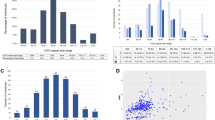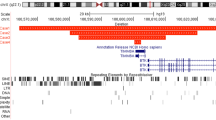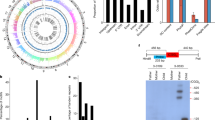Abstract
The mutation responsible for fragile X syndrome and myotonic dystrophy involves the amplification of a simple trinucleotide repeat sequence, which increases in successive generations of affected pedigrees accounting for increasing penetrance of both disorders. This common molecular basis suggests that the two diseases may share other genetic features, but whereas myotonic dystrophy exhibits a significant founder chromosome effect, fragile X syndrome apparently has a very high mutation frequency. By haplotype analysis of microsatellite markers which flank the fragile X unstable element, we have uncovered evidence of founder chromosomes of the fragile X ‘mutation’. Disorders caused by heritable unstable elements may therefore exhibit common genetic properties including anticipation and founder chromosomes.
This is a preview of subscription content, access via your institution
Access options
Subscribe to this journal
Receive 12 print issues and online access
$209.00 per year
only $17.42 per issue
Buy this article
- Purchase on Springer Link
- Instant access to full article PDF
Prices may be subject to local taxes which are calculated during checkout
Similar content being viewed by others
References
Richards, R.I. & Sutherland, G.R. Trends Genet. (in the press).
Sherman, S. in Fragile X Syndrome (Hagerman, R.J. & Silverman, eds) 69–97 (John Hopkins University Press, Baltimore, 1991).
Yu, S. et al. Science 252, 1179–1181 (1991).
Oberlé, I. et al. Science 252, 1097–1102 (1991).
Kremer, E. et al. Science 252, 1711–1714 (1991).
Yu, S. et al. Am. J. hum. Genet. 50, 968–980 (1992).
Rousseau, F. et al. New Engl. J. Med. 325, 1673–1681 (1991).
Richards, R.I. et al. J. med. Genet. 28, 818–823 (1991).
Fu, Y.-H. et al. Cell 67, 1–20 (1991).
Weber, J.L. Genomics 7, 524–530 (1990).
Verkerk, A.M.H. et al. Cell 65, 905–914 (1991).
Drugge, U. et al. Am. J. med. Genet. 38, 363–366 (1991).
Harley, H. et al. Nature 355, 545–546 (1992).
Buxton, J. et al. Nature 355, 547–548 (1992).
Aslanidis, C. et al. Nature 355, 548–551 (1992).
Sutherland, G.R. et al. Lancet 338, 289–292 (1991).
Harley, H. et al. Am. J. hum. Genet. 49, 68–75 (1991).
Richards, R.I. & Sutherland, G.R. Nature Genet. 1, 7–9 (1992).
Schlötterer, C. & Tautz, D. Nucl. Acids. Res. 20, 211–215 (1992).
Vergnaud, G. et al. Genomics 11, 135–144 (1991).
Author information
Authors and Affiliations
Rights and permissions
About this article
Cite this article
Richards, R., Holman, K., Friend, K. et al. Evidence of founder chromosomes in fragile X syndrome. Nat Genet 1, 257–260 (1992). https://doi.org/10.1038/ng0792-257
Received:
Accepted:
Issue Date:
DOI: https://doi.org/10.1038/ng0792-257
This article is cited by
-
At what rate do new premutation alleles arise at the fragile X locus?
Human Genetics (2013)
-
Expandable DNA repeats and human disease
Nature (2007)
-
FMR1 haplotype analyses among Indians: a weak founder effect and other findings
Human Genetics (2003)



